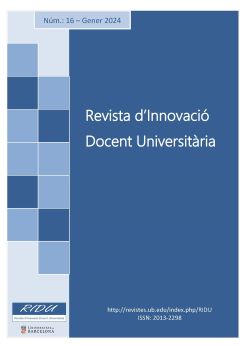Emotional skills for the development of learning to learn competence
DOI:
https://doi.org/10.1344/RIDU2024.16.3Keywords:
Emotional education, Emotional skills, Learning to learn competence, Methodologies, DimensionsAbstract
Throughout the last decade, educational research has highlighted the importance of developing emotional skills in the academic environment, at all educational levels. The fact that the student possess intrapersonal and interpersonal skills favors the development of the Learning to Learn (LTL) competence, called key competence, as well as promotes a society with greater potential.
The general objective of this study is to find out the degree of acquisition of different skills that are collected among the five dimensions that make up the LTL competence: cognitive, metacognitive, affective/motivational, social/relational and ethical according to Gargallo-López et al. (2020). For this, the CECAPEU questionnaire has been supplied during the 2022-2023 academic year among a sample of 80 students of the degree in pedagogy from the University of Valencia. The results of this affect the need to further develop the social/relational dimension, where emotional skills could be studied.
References
ANECA (2008). Manual de procedimiento para la emisión de informe de evaluación de las solicitudes de implantación de Títulos Oficiales de Posgrado. https://www.aneca.es/documents/20123/133806/informe_calidadenunis07_abrev.pdf/9efea4c6-0836-d320-164c-537d38858a77?t=1669117877839
Aránega, S. (2018). El trabajo en equipo interdisciplinar en la universidad con estudiantes de diferentes titulaciones del ámbito educativo. Octaedro.
Bautista, G., y Escofet, A. (2013). Enseñar y aprender en la universidad: claves y retos para la mejora. Octaedro.
Buxarrais, M. R., y Martínez, M. (2010). Educación en valores y educación emocional: propuestas para la acción pedagógica. Education in the Knowledge Society (EKS), 10(2), 320-335. https://doi.org/10.14201/eks.7519
Caprile, M., y Serrano, A. (2011). The move towards the knowledge-based society: a gender approach. Gender, Work and Organization, 18(1), 48-72. https://doi.org/10.1111/j.1468-0432.2010.00534.x
Cherniss, C., y Goleman, D. (2005). Inteligencia emocional en el trabajo. Editorial Kairós.
Comisión europea (2006). Recomendación del Parlamento Europeo y del Consejo, de 18 de diciembre de 2006, sobre las competencias clave para el aprendizaje permanente. Diario oficial de la Unión Europea, L394, de 30 de diciembre de 2006. https://eur-lex.europa.eu/legal-content/ES/TXT/?uri=CELEX%3A32006H0962
Consejo Europeo (2018). Recomendación del consejo del 22 de mayo de 2018 relativa a las competencias clave para el aprendizaje permanente. Diario Oficial de la Unión Europea C 189, del 4 de junio de 2018. https://eur-lex.europa.eu/legal-content/ES/TXT/PDF/?uri=CELEX:32018H0604%2801%29
Cortina, A. (2013). ¿Para qué sirve realmente... la ética? Paidós.
Fragoso-Luzuriaga, R. (2015). Inteligencia emocional y competencias emocionales en educación superior ¿un mismo concepto?. Revista Iberoamericana de Educación Superior, 6 (16), 110-125. https://doi.org/10.1016/j.rides.2015.02.001
Gargallo-López, B., Suárez-Rodríguez, J. M., y Pérez-Pérez, C. (2009). El cuestionario CEVEAPEU. Un instrumento para la evaluación de las estrategias de aprendizaje de los estudiantes universitarios. RELIEVE, 15(2), 1-31. https://doi.org/10.7203/relieve.15.2.4156
Gargallo-López, B., Pérez-Pérez, C., Verde-Peleato, I., y García-Félix, E. (2017). Estilos de aprendizaje en estudiantes universitarios y enseñanza centrada en el aprendizaje. RELIEVE, 23(2), art. 2. http://doi.org/10.7203/relieve.23.2.9078
Gargallo-López, B., Pérez-Pérez, C., Garcia-Garcia, F. J., Giménez-Beut, J. A., y Portillo-Poblador, N. (2020). La competencia aprender a aprender en la universidad: propuesta de modelo teórico. Educación XX1, 23(1), 19-44. https://doi.org/10.5944/educxx1.23367
Gargallo-López, B., Suárez-Rodríguez, J. M., Pérez-Pérez, C., Almerich-Cerveró, G., y Garcia-Garcia F. J. (2021). El cuestionario CECAPEU. Un instrumento para evaluar la competencia aprender a aprender en estudiantes universitarios. RELIEVE, 27(1), art1. https://doi.org/10.30827/relieve.v27i1.20760
Ley Orgánica 2/2023, de 22 de marzo, del Sistema Universitario. BOE núm. 70, de 12 de abril de 2023.
Ley Orgánica 3/2020, de 29 de diciembre, por la que se modifica la Ley Orgánica 2/2006, de 3 de mayo, de Educación. BOE núm. 340, de 30 de diciembre de 2020.
López, R. (2017). Hacia una innovación docente de calidad en la educación superior. Claves para la reflexión. Foro educacional, 28, 11-28. https://doi.org/10.29344/07180772.28.787
OCDE (2005). La definición y selección de competencias clave: resumen Ejecutivo. https://www.deseco.ch/bfs/deseco/en/index/03/02.parsys.78532.downloadList.94248.DownloadFile.tmp/2005.dscexecutivesummary.sp.pdf
Pereda, S., Berrocal, F., y Alonso, M. A. (2011). Técnicas de gestión de recursos humanos por competencias. Editorial Universitaria Ramón Areces.
Pertegal-Felices, M. L., Jimeno-Morenilla, A., y Sánchez-Romero, J. L. (2011). Use of discussion boards as a student-centered methodology for large groups in higher education. International journal of engineering education, 27(1), 178-186.
Thoutenhoofd, E. D., y Pirrie, A. (2015). From self-regulation to learning to learn: observations on the construction of self and learning. British Educational Research Journal, 41(1), 72-84. https://doi.org/10.1002/berj.3128
Varela-Petito, G. (2010). Facing the knowledge society: Mexico’s Public Universities. Higher Education Policy, 23(3), 436-449. https://doi.org/10.1057/hep.2010.15
Downloads
Published
Issue
Section
License
Copyright (c) 2023 Susana Valero Carrero, Estefanía López Requena

This work is licensed under a Creative Commons Attribution 4.0 International License.
Authors whishing to publish in this journal agree to the following conditions:
- The author or author retain copyright and grants the journal the right of first publication of the paper.
- The texts will be published under license "Reconocimiento Creative Commons 4.0 España", which allows to share, distribute, reproduce and the public communication of the paper, as long as the name of the author or authors and the journal are clearly stated.







